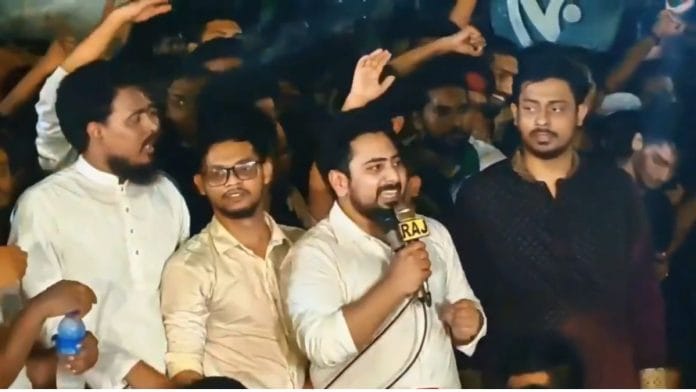New Delhi: Nine months after the ousting of former Bangladesh Prime Minister Sheikh Hasina, the interim government announced the ban on all activities of her party, Awami League, late Saturday, including its online presence. The decision, effective immediately under the country’s Anti-Terrorism Act, will remain in place until the International Crimes Tribunal concludes the trial of the party and its leadership.
An official statement by the government, released after a special meeting of the Advisory Council of the Muhammad Yunus-led interim government Friday, said it was decided at the meeting that all activities of the Awami League would be banned, including cyberspace, under the Anti-Terrorism Act until the trial of the Awami League and its leaders at the International Crimes Tribunal is completed. “This is to protect the security and sovereignty of the country, the security of the leaders and activists of the July coup, and the protection of the plaintiffs and witnesses of the International Crimes Tribunal.”
The statement added, “In today’s meeting of the Advisory Council, it was also decided to finalise and publish the July Declaration within the next 30 working days.”
The declaration of the July revolution was planned by the Anti-Discrimination Students Movement and later by the interim government, to formally recognise the July uprising in Bangladesh last year, and outline the country’s future goals.
The announcement of the ban on the Awami League came a day after Yunus stated that discussions between various political parties were ongoing to implement the decision.
According to Yunus’s statement, the decision was taken during a special session of the advisory council following days of public demonstrations calling for a ban on the Awami League, led by the student-led National Citizen Party (NCP). The protests called for the prosecution of the Awami League for alleged atrocities committed during the July uprising.
Law adviser Asif Nazrul spoke at a briefing outside the Bangladesh Chief Adviser’s residence Saturday, emphasising that the ban was implemented to “ensure national security, protect the leaders and activists of the uprising, and safeguard the plaintiffs and witnesses participating in the tribunal proceedings.”
Founded in 1949, the Awami League now faces heightened legal scrutiny, with advisers also approving an amendment to the International Crimes (Tribunals) Act, 1973—introduced by Hasina in 2010—that empowers the tribunal to impose punishments on political parties, affiliated organisations, or support groups.
Following the announcement, NCP convener Nahid Islam demanded the immediate implementation of all decisions made by the advisory council. He said, “The fascist murderers across the country must be identified and swiftly brought to justice. The Election Commission must quickly revoke the registration of the banned fascist Awami League.”
The protests that led to the ban began late Thursday night outside Jamuna, the Chief Adviser’s residence. NCP Chief Organiser (South) Hasnat Abdullah had called for supporters to gather and press for the outlawing of the Awami League via Facebook.
The protesters then moved to Shahbagh Friday afternoon, where they blocked the intersection and vowed not to leave the streets until their demands were met. The protests spread across Dhaka and other parts of the country.
During the advisory council meeting, which was underway at the time, protesters marched outside Yunus’s residence, threatening to isolate Dhaka from the rest of the country.
At 7:30 pm Saturday, Abdullah issued a one-hour ultimatum, demanding that the Awami League be banned as a political party. At around 9:15 pm, the Shahbagh protest site began to disperse as demonstrators broke off into smaller processions and marched through nearby areas.
Post the ban announcement, Hasnat instructed demonstrators to remain on the streets until the government officially declared its stance on the decision.
In October 2024, the government had already banned the Awami League’s student wing, the Bangladesh Chhatra League, under the Anti-Terrorism Act 2009, due to student protests. That same month, the government reconstituted the International Crimes Tribunal to begin trials for those accused of crimes against humanity during the July uprising.
(Edited by Radifah Kabir)






